- Home
- Gregory Maguire
Hiddensee Page 9
Hiddensee Read online
Page 9
“This potato has more eyes than Dirk does,” muttered Franz.
36.
She was always disappearing. That was her charm and her allure, and it maddened him. Through the hasped gate into the dried and brittle garden; through the low door to the stone yard where the horses would be watered, had there been horses; behind films of cloth. He didn’t think she was being intentionally seductive. Then, he didn’t know much about intention. Or seduction.
37.
That night as he was settling his body down upon the pallet, he thought he heard the sounds for which the boys had waited all day. Heavy wheels over cobbles, curses and snatches of song and high laughter.
Dirk lay back upon the coat he’d folded up as a pillow. With his eye closed, he followed a parade pictured in his mind. A lady in green, not so much saintly as serious, attended by a swarm of birds burnished with torchlight. A congregation of pastors in formation, apparently right at home among this midnight revelry. A goat-legged impresario of sorts. A truculent bear on a chain, sometimes on four paws, sometimes upright. Prisoners in chains, singing. What a motley population the world could pretend to tolerate.
He was looking for Nastaran, for she must be there; she would be coming along any moment.
He was shaken from his vigil. He thought she had come to him at midnight, at last. But it was Franz.
“Moritz,” he said. Franz was keeping his voice low so as not to affright his mother. He was crying. “Moritz has heard the caravan in the streets, and I think he has left to run after it, to watch.”
Dirk was up at once. Taking the older brother by the hand, he slipped out the back door of the house. He left the door on the latch so they could return without waking Nastaran.
“Why didn’t you come to me sooner?” he snapped at the boy.
“I thought I was dreaming,” sobbed Franz. Dirk could hardly fault him for that.
Fortunately the progress of the caravan was easy to follow. The noise hadn’t abated. Indeed, Dirk and Franz weren’t the only midnight pedestrians. More than one curious citizen of Meersburg had come to darkened windows in nightshirt and cap, or donned a greatcoat and shambled out to watch the procession.
Dirk didn’t know why anyone but a child would get up in the middle of the night and tiptoe along the cobbles in the moonlight.
We sleep with exhaustion, thought Dirk. We do this every night, don’t we. And we wake with such exhaustion.
In guttering torchlight among the beery farmers who were beginning to angle their wagons in favored positions around the platz, Dirk caught sight of Moritz. He looked abandoned and cold. Franz reached him first, and it seemed to Dirk that initially Moritz hardly recognized his brother. But the moment passed, and Moritz became alert, and seemed only a little cross to be found. “Ach, I’m in for a thrashing,” he said, slipping his hand into Dirk’s. “I’m sorry.”
“Why did you come outside?” asked Dirk, equably.
The boy shrugged. “We waited till evening. I couldn’t wait till morning, too.”
What doesn’t arrive by day has to arrive by night, if it is to arrive at all, thought Dirk. “There’s not much to see.” Already the singers had quieted, the rumble of carts was done, and the whole party was laying out bedrolls under their wagons. Otherness subsided. Dirk felt as if the company dragon must have been led to the church graveyard, and the angels ascended to roost invisibly on the leads of the vestry. Ghosts in their disguise of moonlight, basilisks in the blue stone shadows.
They crossed the emptied streets. The town was now quiet, nearly serene. An owl, a breeze, a scatter of dried leaves across a lane, a barking cur. Then, Nastaran. By the fountain. She was trailing her fingers along the lip of the well. The crouching stone bear that emblemized Meersburg was holding the carven arms of the municipality and staring blankly beyond Nastaran. She was barefoot, dressed in gauzes, and her womanly form showed in the moonlight through the garments. Her brow was covered with a mantle that gave her the look of a biblical heroine. Her eyes were open but her gaze was not upon the well, not upon her boys, nor upon Dirk as he approached her slowly, as one might approach a skittish foal. A new patterning of cloud had come in; the sky seemed to be paved of softly luminous blue brick.
“Nastaran,” he said with great tenderness, and reached out his hand. She might alight there in the cup of his palm, he felt.
She walked right by him. She could sidestep the winch and the housing of the pump, but she couldn’t see him. Her shoulder and her right arm pressed into him, her unclasped breast rolled against his forearm. And then she recoiled, the back of her hand to her mouth in fright, her eyes twitching to locate herself in foreign particulars.
“Mutti!” cried Franz, and ran forward. She suffered herself to be greeted but she didn’t clasp him. “Where were you going? Were you looking for us?”
“No,” she answered, when she could speak. “I wasn’t looking for you.”
“Then where were you going?”
“You are still there,” she said. “Already.”
“I don’t understand.”
Hearing his mother’s vatic remarks, Moritz looked up with a dark brow and spilled a remarkably foul and adult comment almost under his breath.
She gripped Dirk’s arm and allowed herself to be walked toward home. Halfway there, she stopped and fastened a silken cincture to keep the panels of her blouse closed. Farther along, she dropped his arm and stepped a foot away from him, but kept pace. When they’d reached the house and secured the door, and the boys had been put to bed, Dirk poured her a little Kirschwasser. She drank a sip, and then stood to return to her room without further comment. Following, Dirk was too tired to be mindful of his manners. “But where were you going?” he asked her as she was turning to shut her door. He put his foot in the breach to keep the door open. “Nastaran,” he said, with longing. “What are you looking for?”
With a few inches of space between their faces, she raised her dark eyes to him and regarded him keenly and openly. Her eyes were too damp, her face looked disarranged. She told him, “I don’t know. If I could only find out—”
38.
Nastaran took to her room and wouldn’t come to the door when Dirk knocked. The boys awoke at last, cross and dull-eyed, but wolfed their breakfasts and dressed to be brought out to the opening of the fair.
Perhaps the entire town had been awakened by the midnight commotion of arriving merchants and revelers. In the morning when Dirk went to the well, Meersburg seemed more than usually shuttered against him, the streets empty. What is a town but an assemblage of locked and secret chambers, he thought. The forest opens its arms more gladly.
In the scientific light of day, the midnight sense of mysterious presences had evaporated. Most stalls were heaped with ordinary harvest.
However, a few booths featured carved figurines, puppets and the like. Garishly painted. A population of mute and obvious toys. Mere figments of the exotic bestiary that had seemed to sweep into town by moonlight. Insults to them, actually.
Dirk watched how the Pfeiffer brothers paused over the toys. The old man in the forest—surely he used to carve figures? Not like these, though. Stout oaken gentlemen with mugs of beer, one in each hand. A wooden horse, two apes on its back. A doll that stood by itself, staring catatonically out of a porcelain head as perfectly ovoid as a grape. Her real cloth skirt featured real wrinkles. A few rod marionettes in the shape of officers with crested helmets. The boys were gentle, even reverential with the military figures. But Dirk had no coin with which to buy presents, so vendors shooed all three of them on.
Vexed at Dirk for apparent minginess, the boys ran off. He let them run. No harm could come to them now. However busy the residents of Meersburg, they wouldn’t let danger come near a child, not even one with a foreign look in the eye, an olive cast to the skin.
Dirk was still musing on Nastaran and her concerns when he felt a tap on his shoulder. At first he couldn’t even find the name on his lips. “Felix,” supplied the
young ’cellist. “Felix Stahlbaum.”
The story of Hannelore and her pregnancy struck at Dirk, but lightly. He cared nothing for her. Or for Felix. Dirk did not hold out a hand or utter a greeting.
“I’m here for the festival,” said Felix. “We’ve come from the university. Baron von Koenig is presiding over some municipal ceremony, and either receiving an honor or bestowing one, I forget which. He’s also assembling a gaggle of his associates who dabble ineptly in atmospheric experiments. He sent for Kurt, and I accompanied him. I thought I might see you, if you were still in town.” He looked with happy scrutiny, as if Dirk were a specimen of exotic snail or an oddly designed fern. “I’ll stand you an ale. Look, that tavern has some benches set out. The light is nice. Come with me.”
“I’m looking for some boys—”
“I thought you might be. Stop a while; whoever you want will pass by in time.”
Felix meant something other than Dirk did, but it was true, Franz and Moritz wouldn’t be far. Dirk could keep an eye on the proceedings from a bench. Warily he settled in the lackluster sunlight. Soon enough he spied Franz, watching some young louts of the town play skittles; Moritz hunched on the sidelines, too. Felix Stahlbaum looked to see what had caught Dirk’s eye. “Who will be the winner?” he asked, amusing himself.
Dirk couldn’t follow. He said, “Someone suggested to the Baron that I was—was with Hannelore.”
Felix shrugged, toasted Dirk. “Vive la différence. You were involved with her. Weren’t you?”
“But you admitted it was you all along.”
“Who knows why we say and do what we say and do? I thought better of ruining anyone’s life,” said Felix after a silence.
“Because of that rumor, I lost my chance to stay on with the von Koenig household,” replied Dirk. But then, he might not have been sent to the papermaker, and might never have met Frau Nastaran Pfeiffer. “No matter. What’s done is done. I didn’t know you realized I was in the chapel that day. That’s all.”
“The door was open. Who else knew where the key was hidden? Anyway, I tried to play up a storm for you, as I recall,” said Felix. He yawned. “Sorry—a late night.”
“For everyone,” agreed Dirk. “You are still playing?”
“My Lehrmeister has me working over several string trios of van Beethoven. And I’ve just got my hands on a ravishing piece by de Saint-Colombe. Practice does get in the way of my theology studies, I am afraid.”
“You will be a pastor? After you’ve fathered an illegitimate child?”
Felix laughed. “I intend to learn only enough theology to know how to sin more effectively, thus to become more deeply penitential. The darker the sin, the richer the value of spiritual recovery.” He was speaking in a level of nuance beyond Dirk’s apprehension: droll, insincere, affectionate. “No, I hope to become a better performer, to be worthy of the music I am learning. If knowing music can bring me relief, can—move me across the border—how to say this—can release me, perhaps, to write my own, so others may be moved as I have been—is there any other ambition? Theology and art aim in the same direction.”
Dirk had nothing to say on the matter, so he slurped at the ale. Felix said, “What are your aims, young man?”
“I have no talents,” said Dirk. “I only watch and listen.”
“You have a talent of charm, I see you do.”
“I cannot see—what did you say about it—across borders. I have never been able to see that. But I know someone who can, I think, but is stuck—cannot take the step.”
“Music usually helps,” said Felix. But he seemed to realize that remark was glib, and he relented. “Tell me what you mean.”
Without naming Nastaran, Dirk told Felix about a woman from somewhere in the Near East, a woman possessed of a dybbuk of sorts, pestered by an incubus, that caused her to walk at night in her sleep. She couldn’t name the destination, so she was haunted and trapped in this syndrome. If she could be released, Dirk said, who knows where she might go?
“Perhaps into a church tower with you?” asked Felix, knocking Dirk’s calf with the toe of his boot.
“Franz! Moritz?” called Dirk, standing up.
“Wait,” said Felix. “I have an idea. I heard of someone who might help. I don’t know the man, and he has become elderly, but I’m told he lives right here in Meersburg. Would you like me to see if I can get an appointment for your mysterious somnambulist?”
“What must I pay you for your help?” asked Dirk.
“I’ll think of something.” He downed the last of his ale and tossed a few pfennigs upon the boards. “Though the von Koenig family is here only occasionally, the Baron knows everyone in Meersburg. Baron von Koenig will open any doors for me that I ask. I’m sure the door to Herr Mesmer’s apartments are no exception.”
Felix took down the address of the Pfeiffer household and left brusquely, without a good-bye. The cinnamon reek of rot that accompanies harvest was beginning to rise as the morning sun strengthened.
39.
The physician had a suite of rooms above the Heilig-Geist Spital in Vorburggaße. Dirk and Felix found the man settled in a wooden armchair upon a heap of faded cushions. He was in his seventies, perhaps late seventies. He said, “I am Doktor Mesmer. I am told”—glancing again at the letter of introduction unfolded in his lap—“that I am to be at your service, young Stahlbaum.” He winced even to raise his right hand to grab Felix’s.
“This is a preliminary visit.” Felix glanced back at Dirk, who was standing behind him in the shadows. “I’d like you to explain to my friend what you might do to help the mistress of his employer’s house. She suffers an odd ailment.”
“I might do nothing to help her. Is that explanation enough?”
“He doesn’t understand your theory and practice, and I’m not competent to clarify.”
“I don’t entirely understand it myself,” said the old man. “Is that perhaps a flagon of schnapps you have brought as a present? A good deal of therapy starts and ends with a bolt of schnapps, I find. My nephew, who runs this hotel for the elderly, arranged my rooms right above the winepress, the rental cost of which helps support his whole operation. But little wine is pressed in my direction. It’s a sore trial to me, the proximity of possibility. Very Tantalus, very Aesop.”
Felix uncorked the flask and poured a portion in a gummy glass with a chipped gold rim. There was only one glass. Doktor Mesmer fortified himself. “I have been discredited in Vienna and I have been discredited in Paris,” he declared. “Lavoisier was cutting, the bastard, but at least that visiting gasbag, Herr Benjamin Franklin, managed to be witty in his dismissal of my claims. I am parading my high-fledged associations for your admiration, in case you haven’t noticed. How tawdry of me. Am I obliged to humiliate myself further at this stage in my life?”
“We won’t keep you long. But you might help. I should be so grateful.” Felix said that last in a way that suggested the mildest sort of menace, a pressure brought to bear upon a man who couldn’t stand up from a chair without the help of a cane. Felix went on. “Where shall I start? Your work concerns a theory of affinity between animals as they meet and correspond with one another, is that aptly put? A sympathetic hydraulics of vapors and fluids, a depression of phlegms? A rising of invisible energies? I practiced these definitions last night to get them right.”
“I see you like that part. The young always like that part,” said Doktor Mesmer. “Sometimes my theory is known as animal magnetism. Have you a canary, perhaps, with a chronic malaise? Won’t sing? Much can be achieved by understanding the psyche of the canary. Listen to your canary. Did you know psyche is the ancient Greek word for soul? Of course you did.” He was mocking them, mocking himself.
“Tell us about the part that’s come to be known as Mesmerism,” prompted Felix.
“Ailments.” The Doktor appeared to be addressing the schnapps. “Physical abnormalities. What are they? A blocking in the circulation of vital liquors? Perhaps. If so,
an induced crise—a trance state—can sometimes be helpful at restoring vigor. This aids in recuperation and for a while it also allowed me to keep up with my debts. But, Herr Stahlbaum, I’m not about to treat your young friend.” He glared over Felix’s shoulder at Dirk. “I can see from here that he is beyond help. Those born dull remain dull. I shall not be sued for incompetence. I won’t open myself to that indignity.”
“I told you, it isn’t him,” said Felix. “And if we don’t pay you for your services, we can hardly sue you if you fail to satisfy. Isn’t that true?”
The elderly gentleman—charlatan or seer, Dirk had no way of knowing—sighed. His hands trembled, one on the stem of the glass, one on the letter in his lap. He said, as much to himself as to the young men in the room, “When Herr Benjamin Franklin came in, and I saw his prodigious intelligence and his beaver-skin cap, I wondered if I was having an elective affinity with genius or with a dead beaver. Can you trust anything that I would say?”
“You’re lying about that little vignette.” Felix settled his own felt cap upon his head. “I have affinities of my own. Might you see the person in question tomorrow morning at this hour? A respectable hausfrau?”
“I suppose unless I gouge my own eyes out with a cooking implement, I shall have no choice,” said Doktor Mesmer. “I shall study up my old methods. You’re leaving the flask as tribute, I suppose.” He poured himself a second portion.
Dirk hurtled down the stairs, eager to get away. Outside the front door, Felix bounded after him, chortling. Felix pressed his palms upon Dirk’s shoulders and launched himself in the air, like a boy leaping over a stile, and hooted. “So I have powers of persuasion of my own,” he crowed. “Now you do your job, and persuade your Frau Pfeiffer to meet us here tomorrow.”
40.
As it happened, while Dirk was out with Felix that morning, a letter had arrived from Herr Pfeiffer. He’d taken ill with a bowel complaint and was laid up, unable to begin the arduous return carriage journey until his vitals settled themselves. Nastaran was to forgive him and Dirk Drosselmeier was to continue to maintain the household as directed.

 Missing Sisters
Missing Sisters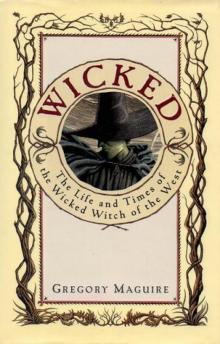 Wicked: The Life and Times of the Wicked Witch of the West
Wicked: The Life and Times of the Wicked Witch of the West After Alice
After Alice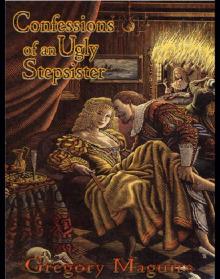 Confessions of an Ugly Stepsister
Confessions of an Ugly Stepsister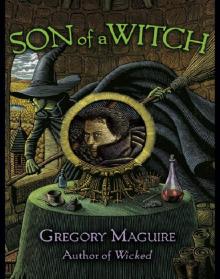 Son of a Witch
Son of a Witch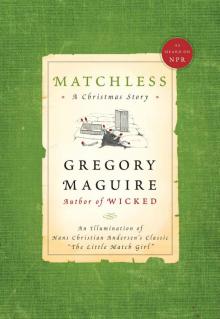 Matchless
Matchless The Next Queen of Heaven
The Next Queen of Heaven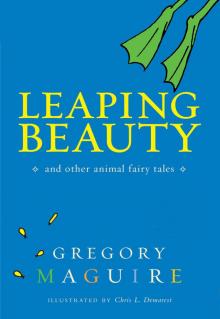 Leaping Beauty: And Other Animal Fairy Tales
Leaping Beauty: And Other Animal Fairy Tales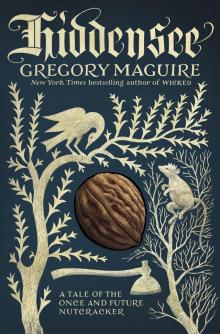 Hiddensee: A Tale of the Once and Future Nutcracker
Hiddensee: A Tale of the Once and Future Nutcracker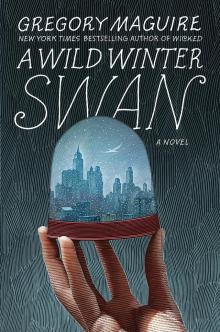 A Wild Winter Swan
A Wild Winter Swan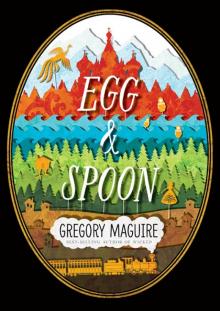 Egg & Spoon
Egg & Spoon Out of Oz
Out of Oz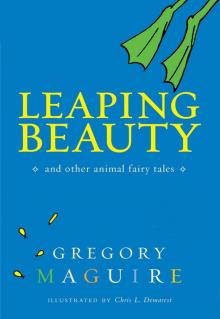 Leaping Beauty
Leaping Beauty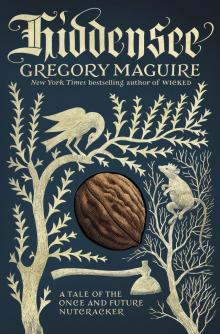 Hiddensee
Hiddensee The Wicked Years Complete Collection
The Wicked Years Complete Collection The Next Queen of Heaven: A Novel
The Next Queen of Heaven: A Novel